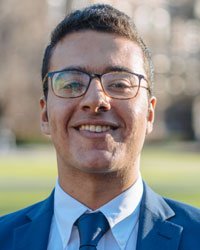
When Vitraag Mehta ’17 graduated from the University of Rochester with a degree in financial economics, he found himself at a disadvantage in the job market. As an international student, Mehta, whose home is in Mumbai, India, could only be employed by an American company, on US soil, for one year under the federal Optional Practical Training (OPT) rules.
“The University of Rochester is beautiful for its many programs and educational expertise, but foreign students often get beat on the networking portals,” says Mehta. “Companies are reluctant to hire graduates for one year, since they would have little opportunity to benefit from the training they invested in their new hires.”
And in the summer of 2017, the story looked the same for Alhassan Ali Omar ‘18, a native of Egypt who was to graduate the following May with a degree in economics and a minor in business.
That all started to change that summer, when Omar had breakfast with a group of friends in New York City. “One of them mentioned that they changed the classification of the economics department at Brown University, opening up post-graduate possibilities,” says Omar. “Once I realized that we could do that same at Rochester, I contacted Vitraag.”

What Omar didn’t realize was that Mehta had been sifting through a list of STEM majors on a government website and discovered code 45.0603—Econometrics and Quantitative Economics.
The Department of Homeland Security provides visa extensions for STEM (Science, Technology, Engineering, and Math) graduates as a way to help small businesses enhance “economic, scientific and technological competitiveness through increased research, innovation and knowledge.” With a STEM-classified degree, students who are in the US on F-1 visas are eligible for two-year OPT extensions, which would give them a total of three years to gain valuable experience in the workplace. After finding code 45.0603, Mehta was convinced that the economics department at the University met the requirements of a STEM classification.
Armed with that information, Mehta, along with Alhasssan Ali Omar ’18, contacted Alan Czaplicki, the associate dean of the College, in the hopes of making the change at Rochester.
“I was initially cool to the idea,” says Czaplicki. “I needed to make sure that changing the status quo would benefit students.”
Czaplicki talked it over with Michael Wolkoff, the deputy chair of the Department of Economics, and the two quickly came to the conclusion that a STEM classification would, indeed, benefit economics graduates. Once the decision was made, it took four months of administrative work to get the new classification approved.
“Graduates need to find a job in order to gain necessary experience in their fields,” says Wolkoff, “and employers need a minimum of two years availability.”
Beatriz Gil ’19, whose native country is Spain, looks forward to an additional two years of eligibility in the US. “I plan to have a career in politics, perhaps diplomacy,” says Gil, who is president of the Students’ Association at Rochester. “But first, I would like to gain experience working for a private company in the US.”
Before getting that experience, Gil will have to enter a lottery in the hopes of obtaining one of the 65,000 annual work visas issued by the federal government each year. But she will have an advantage, as those with OPT STEM status have additional chances of winning.
While the STEM classification is good for economics graduates, it may also help the University to attract students from abroad.
“Economics has long been a popular major for international students, so this assurance of three OPT years can only help us build on that success,” says Jonathan Burdick, vice provost for enrollment initiatives and dean of admissions and financial aid. “I’m tickled that international students set this idea in motion for themselves, and gratified that many of our students already here can begin to take advantage of it.”
That advantage has already made the re-classification a success in the eyes of Czaplicki, who says the goal of the University is to make sure students are well prepared for the future. “To some degree, the re-classification was altruistic. We just want to do what’s best for our students,” says Czaplicki. “The change was simply an administrative shift that provides benefits. So why wouldn’t we do it?”
And the economics department was not alone at Rochester in changing its classification. This past summer, the Simon Business School took the same route for its international students, with the added distinction of becoming the first business school in the US to gain STEM certification.
Rochester joins a handful of other universities in achieving the STEM designation for economics. Massachusetts Institute of Technology and Yale University have also had their economics departments classified as STEM. And it seems others are on the way to making the same move.
“After the economics department at Rochester made the change, Alhasssan and I were approached by international students at Berkeley and Northwestern who wanted help in achieving the same thing at their universities,” says Mehta. “It seems our success has helped create a wave at academic institutions across the country.”




